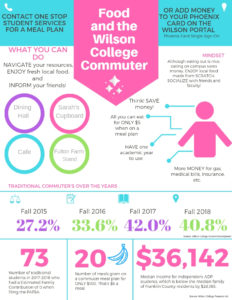Wilson Class Teaches About Food Insecurity
A course that has emerged on campus is that of Food, Culture and Society, taught by Professor Julie Raulli. This class gets students to critically think about food and its place in society on all spectrums of the poverty line. Furthermore, the course explores some of the many facets of food in society, including its symbolic power and the ways that food production and consumption are structured by social inequalities, both nationally and globally. Professor Raulli commenced the class so that, “Wilson students could experience our beautiful campus farm, and to explore sociological ideas and social inequalities by examining the everyday act of consuming food.”
Raulli ardently discusses the topic in her class, habituating students with the fact that all members of society are affected by food insecurity. A large portion of the community, including middle-income families, senior citizens and college students “experience hardships accessing food and knowing where their next meal is coming from.”
Students in the class are required to create a project that would help others in our community learn about food security and the resources available to those who need it. For example, a couple of Raulli’s students are presenting on Sarah’s Cupboard on campus which, “in terms of resources, we are fortunate to have Sarah’s Cupboard on campus.” Many people at Wilson are unaware of it and is the main reason why it was chosen, “to educate others about this community resource.” This is just one example Professor Raulli hopes to instill on students here at Wilson and the broad community in general. Students have responded well to the course thus far, plunging in to the assignments and work assigned.
Ethan Kron ’21 exclaims that, “It opens your eyes to things you never noticed about food.”
The use of local resources and analysis in the class highlights a new perspective for students in the class. Kron further explains, “Often times when talking about the food we eat, no one really knows/cares where it comes from. It’s taken for granted. The class puts everything in perspective.”

By the end of the course students will be able to intelligently discuss food production and disparities in consumption as well as demonstrate an understanding of how inequality is reproduced through the everyday activity of producing and consuming food, both in the United States and around the world.

